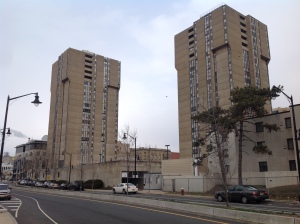
Judge Mary Jacobson overrules another objection from Edward Buzak, attorney representing Princeton and other Mercer County towns, as attorneys from Fair Share Housing Center cross-examine municipal witness Peter Angelides. (click to expand)
One way to mark African American History Month, which began yesterday, is to attend the Fair Housing trial that is currently taking place at Mercer Superior Court in Trenton. The trial features attorneys representing five suburban Mercer County Towns (including Princeton) versus the Fair Share Housing Center, a group that advocates for adherence to New Jersey’s Constitutionally-mandated affordable housing program. The two parties disagree over how much housing should be built, so Assigment Judge Mary Jacobson has scheduled months of hearings to try to evaluate each sides’ case. Princeton elected officials have characterized all this as just a matter of procedure, but any member of the public who attends can see that this is not the case. Dozens of New Jersey towns have already settled to avoid the kind of court proceedings currently underway.
At the trial on Tuesday, Peter Angelides from Econsult Solutions, Inc, who is working for the municipalities, continued his explanation of how he had calculated housing numbers for each town. The slides presented by Angelides showed different proposed housing figures than those circulated by the town of Princeton last week in a document intended to justify the ongoing litigation, because the numbers used by the town are out-of-date. Under crossexamination, he admitted that his approach produced lower housing requirements than other methods. Asked to consider how his approach might impact specific communities, Angelides said he could not point to Monmouth or Somerset Counties on a map of New Jersey, and had little familiarity with Morris County, although he thought it was ‘struggling somewhat’ (it’s the 16th-richest county in the USA).
Throughout, attorney Edward Buzak, who was hired by Princeton and the other municipalities, made numerous objections to questions posed to Angelides. Many of these objections were overruled by Judge Jacobson. Angelides was also a key witness in a housing case fought by South Brunswick last year, in which they argued that $500,000 houses should contribute toward their affordable housing requirement. The judge rejected that argument, calling it ‘flawed’, and subsequently set a requirement for South Brunswick to plan for 2,907 affordable homes.
Princeton elected officials maintain that it is impossible to strike a settlement deal with Fair Share Housing Center to end the legal action, even though Hamilton Township Council member Dennis Pone (R) said his town could “easily” meet housing obligations arising from their settlement. In the past week, Robbinsville Mayor Dave Fried issued a statement thanking Fair Share for agreeing a mutually-satisfactory settlement that will for 638 affordable homes in that town. By striking this settlement, Robbinsville is no longer part of the current trial in Trenton. Meanwhile, Hopewell Township Committee Member Vanessa Sandom announced that Hopewell has presented three housing plans to the court, for 500, 750 and 1,000 homes. Any of these would be greater than the 445 homes proposed by Princeton, which appears to have the most limited housing plan in the region.
The ongoing trial is very technical, because the methodology for calculating affordable housing numbers is complex, and considers at least 23 different criteria. In principle, this is better than a ‘one size fits all’ approach, but it tends to produce long, painstaking court proceedings when towns choose to challenge every single step, as is happening now. Because of ongoing arguments about how to caculate the housing numbers, no figures have been agreed since 1999, when Bill Clinton was President. During this time, many suburban municipalities have placed strict limits on what housing can be built, using local zoning ordinances. During the trial, I happened to look through the window of the courtroom, which faces the ‘Kingsbury Corporation Twin Towers’, an urban renewal-era affordable housing project on New Warren Street:

Mercer County Superior Courthouse (at left, in background), and affordable housing at the Kingsbury Corporation ‘Twin Towers’ in Trenton, NJ. (click to expand)
While $375-an-hour attorneys are working to limit the amount of affordable housing built in predominantly-white New Jersey suburbs, the mostly black and low-income residents of projects like the ‘Twin Towers’ are struggling to get by, locked out from the many opportunities, leafy parks and good schools found in towns like Princeton. This was the lesson I took for my Black History Month: segregation in 2017 isn’t done by mobs with burning crosses, it’s done by lawyers, disingenuous politicians, and people who are prepared to look the other way.
- The local non-profit housing group, Housing Community Develeopment Network NJ, is encouraging volunteers and advocates to sign up to attend the ongoing housing trial involving Princeton. Potential dates are indicated at their web form at this link.

Its disturbing that you see fit to pinpoint African Americans as being poor or in PC terms, “financially distressed” and infer no one else has problems. If African America history and it’s notable people that go with it represent anything its that they are as capable of success as anyone else if education and job opportunities are made available. All of which are accessible regardless of where you call home. However, I thought this was about affordable housing not race. Further, there are plenty of other ‘races’ that are poor too. Further, you nor anyone else has ever developed a metric to show whether or not a town is fair. Its easy to blame your problems on other factors but that dissolves quickly when you see other folks (from Asia and Africa) immigrate to this country and become successful without complaining about their present conditions.